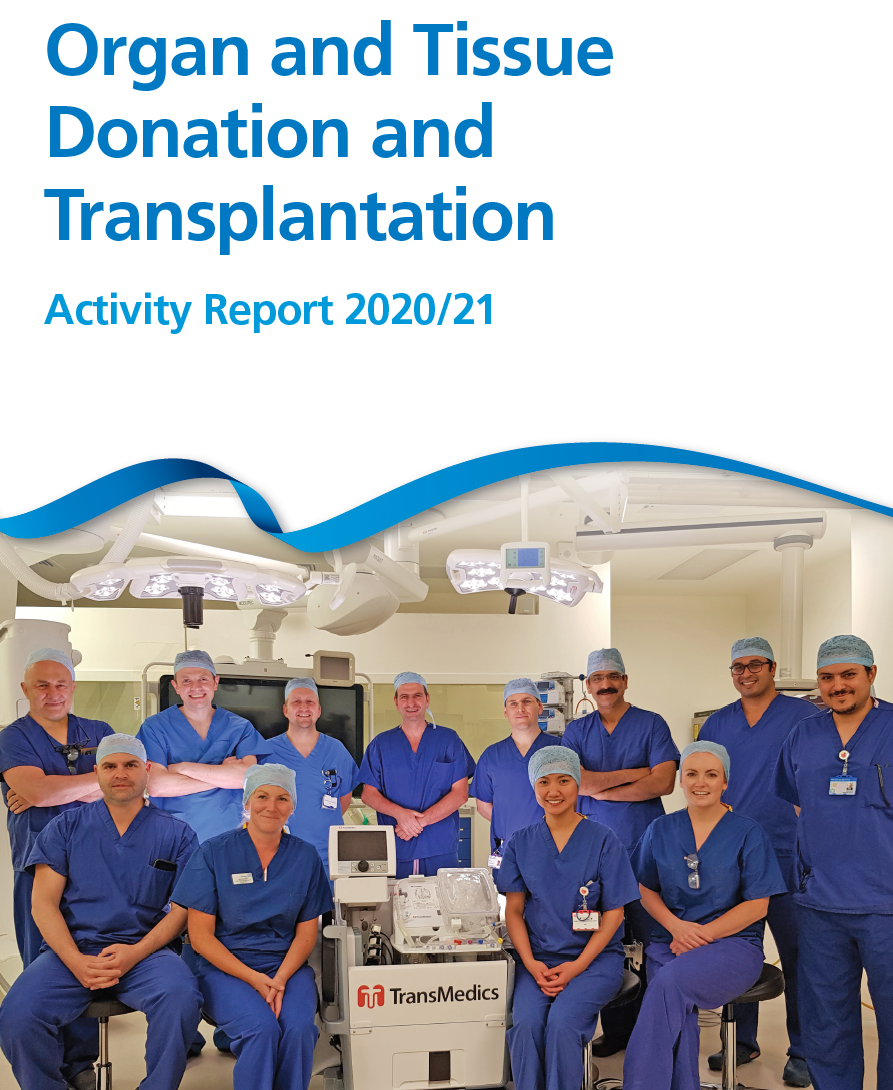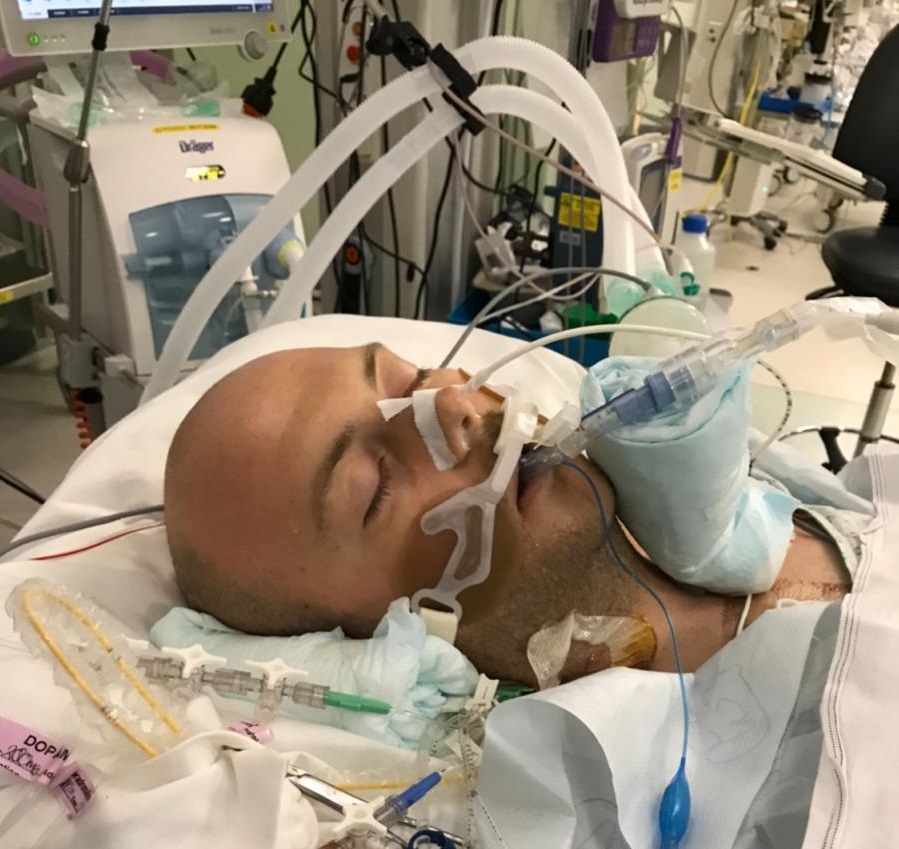Organ donation achieved three quarters of its normal activity last year despite global pandemic
A report out today from NHS Blood and Transplant shows that despite the strains that Covid-19 put on the NHS over the last year, 3,391 people in the UK had their lives saved thanks to the generosity of 1,180 people donating their organs after death.
 The Organ and Tissue Donation and Transplantation Annual Activity Report 2020/21 shows that despite the global Covid-19 pandemic, levels were sustained at 75% of normal deceased donation activity and around 80% of normal transplant activity.
The Organ and Tissue Donation and Transplantation Annual Activity Report 2020/21 shows that despite the global Covid-19 pandemic, levels were sustained at 75% of normal deceased donation activity and around 80% of normal transplant activity.
This is testament to the strong foundation of altruism from families, support for donation across the UK and the dedication of clinical teams.
The number of patients registered on the active waiting list for a transplant in the UK fell to 4,256 at the end of March 2021, however, this does not fully reflect the number of people who need an organ transplant.
Many patients were removed from the transplant list or transplant programmes closed during the peak of the pandemic as it was riskier to carry out transplants and NHS resources were under extra pressure.
Sadly 487 patients died waiting last year, compared with 372 the previous year.
Transplant centres are still getting through the backlog of new patient referrals and are currently re-activating those who were temporarily suspended back on to the waiting list, and it is currently forecast that the number of those likely waiting for a transplant in the UK is now around 7,000 – a figure last seen in 2012/13.
The impact of Covid-19
The Covid-19 pandemic has led to unprecedented challenges for transplantation in the UK and around the world.
Concerns about the ability to safely treat transplant recipients in hospital, the lack of access to resource due to it being used for Covid patients, and the risk versus benefit for immunosuppressed transplant recipients and those waiting for a transplant, have understandably resulted in a reduction in the number of organ transplants undertaken during the height of the pandemic in 2020.
John Forsythe, Medical Director of Organ and Tissue Donation and Transplantation, at NHS Blood and Transplant, said: “This past year has been completely unprecedented in the history of the NHS, as well as in our wider society. So, the fact that we managed to maintain three quarters of our normal donation and transplantation activity is absolutely phenomenal.
“There’s no escaping the fact that organ donation and transplantation will take some time to recover completely, as will the rest of the NHS.
“But with a great team effort across clinical teams, deceased organ donation and transplant activity continued for the most urgent patients during the first wave of Covid-19 and returned to pre-Covid levels quite rapidly, with July and August being record summer months for donation and transplantation. In later surges the teams managed to keep the majority of these vital procedures going.
“Each one of us in the wider clinical team of donation and transplant, across the UK, are immensely proud of the work to keep organ donation and transplants happening in the most challenging circumstances. But our commitment is nothing compared with donors and their families – the gift of life has been donated in the midst of a tragedy made even more difficult by Covid restrictions.
“However incredible this achievement, we mustn’t forget that there are still thousands of people in need of lifesaving organ transplants and we are doing our utmost to work with clinical teams and donor families to try and close the gap between those receiving a transplant and those still waiting.”
Consent rates have risen
The number of families giving consent/authorisation for organ donation to go ahead has risen this year, from 68% to 69% overall for donation across the UK.
This is the sixth consecutive year that consent/authorisation rates have increased, which is particularly significant, given the fact that the change in the English law around organ donation came into effect right in the midst of the first wave of Covid-19 and the associated lockdown, a time that brought immense challenges for patients and their families who were often unable to visit, even when their loved one was seriously unwell.
Consent for organ donation was even more difficult for families during the pandemic as the sensitive conversations often had to be done virtually rather than face to face.
Claudia's story
One family who made the brave decision to agree to donation during the height of the pandemic last year was that of 23-year-old Claudia-Rose Moor from St Leonards in East Sussex.
 Claudia was critically injured in a car accident in April 2020 and was airlifted to Royal Sussex County Hospital where doctors battled for 4 days to save her life. However, Claudia had sustained traumatic brain injuries and her family were told she would not survive.
Claudia was critically injured in a car accident in April 2020 and was airlifted to Royal Sussex County Hospital where doctors battled for 4 days to save her life. However, Claudia had sustained traumatic brain injuries and her family were told she would not survive.
It was at this point Claudia’s mum, Nichola, remembered a conversation they’d had as a family just a year before and Claudia had insisted that she wanted to be an organ donor.
“I just knew I had to make it happen.” Said Nichola. “Claudia was such a kind, giving, loving person and she would do anything for anyone, so it was no surprise to us that she was so pro-donation, as we all are.
“As it happens, the nurse who was looking after Claudia was a specialist nurse in organ donation who had been re-deployed to ITU during Covid and when I asked her about the possibility of Claudia being a donor, they did all they could to help make it happen, but we knew there could be a possibility it might not be able to go ahead as we were in the height of a pandemic and we had to make sure any organs we agreed to donate were able to be transplanted.
“Luckily, she was able to donate 3 organs – which is amazing. We are so incredibly proud.
“She was the life and soul of the party. She would do anything for anyone. She treated strangers as friends and that’s what’s so poignant about her being a donor. She would give anyone anything, she was so generous, and we are so proud that her lasting legacy is giving life to three other people.
“We got to spend time with Claudia as the preparations were made for her donation. Her sisters were given time to come to the hospital to say goodbye and we were able to hug her and tell her we loved her.
“I don’t think we’d have been able to have all this time with her if we hadn’t made the decision to donate. It gave us that time to be together as a family and we stayed with her right up till she went into theatre.
“She was treated with so much respect and we were really proud when we were told they’d found matches for each of her organs. We knew that although we’d lost Claudia, she’d helped save the lives of 3 people that day and we were thrilled for those families.”
Carl's story
Although the figures for organ donation and transplantation are down from 2019/20, where 4,761 people received a transplant from 1,580 deceased donors.
The fact that organs were donated and transplant operations took place as a priority throughout the pandemic is thanks to the huge support of all those families who agreed to donation in the most difficult of circumstances and the clinical teams who transplanted those most in need.
 Carl Flynn, from Manchester, is one of the patients who has had a transplant during the Covid-19 pandemic.
Carl Flynn, from Manchester, is one of the patients who has had a transplant during the Covid-19 pandemic.
He had a heart attack at the age of 25 and was lucky to survive. Carl was told his heart was failing and continued to deteriorate for a year. He had a left-ventricular assist device (LVAD) fitted and had ups and downs for two years.
Then he got a reoccurring infection and was listed for an urgent transplant in February 2020. In November last year he received his call.
Carl, now 32, says: “It was mixed emotions going on the waiting list, relief, excitement, wondering when it would be, but I wasn’t really afraid after all I’d been through.
“I was following the news and coronavirus was getting closer to the UK and I knew it would hit us. I wondered if I’d get a transplant with the pandemic, things were against me as it was then there was this new virus - you think it isn’t going to happen.
“But I stayed positive and because I live near the hospital, I could wait at home which was safer. That made it a bit easier, but I was isolating and couldn’t see anyone. I started cooking, baking and gardening to keep busy. I had down days but didn’t let it worry me too much.
“Then I got a call in the middle of the night, everything took longer with Covid and extra tests, but I felt safe and everything went well. It was my birthday; it was the most amazing present I will ever receive.
“A couple of weeks later I was home. It’s still early days but I feel amazing, it’s as though I’m myself again. I can swim, I’m back at the gym and I’m starting training for the Transplant Games and I’m looking at starting my own business.
“I think about my donor family every day, it’s an invaluable gift, you can’t get anything better.
“Obviously, it must have been a lot more difficult with Covid, I don’t know if they were able to be with their loved one and that’s awful.
“I don’t know how to say thank you. I can’t thank my donor and their family enough for their kindness.”
The law change
The change in the organ donation law last May in England and in March 2021 in Scotland, means it will be assumed that people want to be a donor after death unless they register otherwise [1].
Even though the law around organ donation has now changed, it is important to know that people still have a choice and families will still be consulted if organ donation becomes a possibility.
This new report shows the number of people opting to potentially be an organ donor after their death rose in 2020/21 and opt-in registrations on the NHS Organ Donor Register now stand at 26.7 million – with just 2 million opting out of deceased organ donation.
Unfortunately, Covid-19 also had an impact on living donation just as it did in most other countries. Living donor transplants fell by 58% to 444, this was due to the fact that we had to pause the UK Living Kidney Sharing Scheme for the safety of both the patient and the donor during the peak of the pandemic.
This has now resumed, and every effort is being made to ensure that it continues to run smoothly.
John Forsythe said: “We realise this has been a very worrying time for those patients who are waiting for a transplant and the families supporting those patients.
“We would like to reassure them that the recovery of organ donation and transplantation, both living and deceased, is well underway and deceased donation rates are back to pre-COVID levels thanks to the huge support of all those families who agree to donation and the clinical teams who work tirelessly to get the best outcome for patients.”
View the Transplant Activity Report 2020/21 in full
Notes
- Those excluded include people under 18, those who lack the mental capacity to understand the new arrangements and take the necessary action; people who have lived in England for less than 12 months; those who are not living here voluntarily and those who have nominated someone else to make the decision on their behalf.

